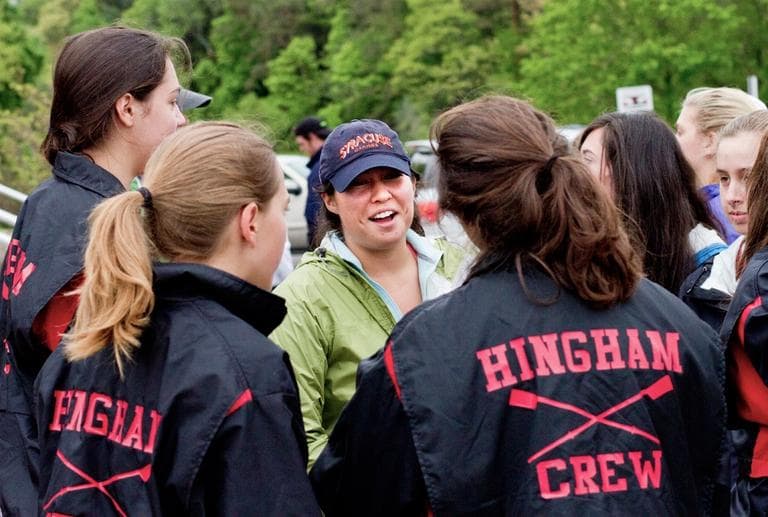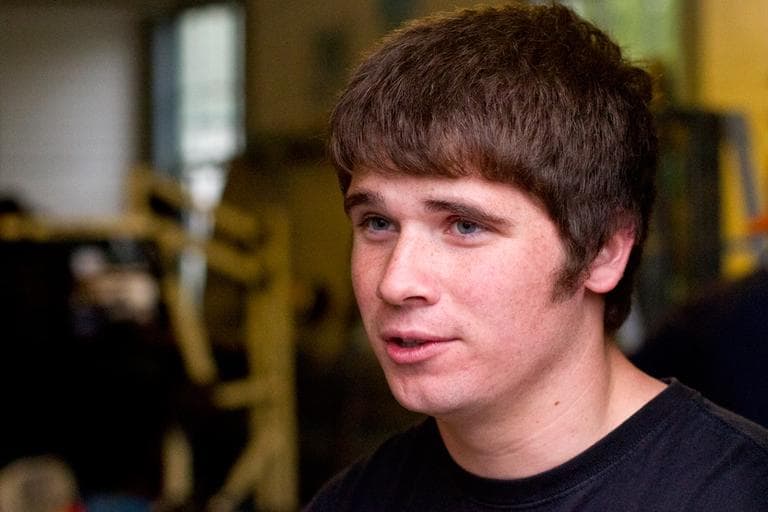Advertisement
One Town Says MCAS Is Misguided In Evaluating Teachers
Resume
If you have a child in public school, you're familiar with the MCAS. But you may not know this: the state Board of Education has decided that student performance on the MCAS has to be a significant component of how teachers are evaluated. The town of Hingham is not happy about the news.
Hingham High School senior Kim Laughlin believes that if her teachers are evaluated on her MCAS scores, they're getting a raw deal.
"MCAS is a bad way to evaluate teachers because I know that when I take tests, I tend to get distracted, and although I get As in classes, tests aren’t always my strong suit," Laughlin says.
Laughlin finishes moving one of the racing shells of the huge Hingham High rowing team. Parents are cheering their sons and daughters as they test their speed across the choppy waters of Hingham harbor.

"They’re all in the same boat," says Ellen Whalen, who pretty much sums up the feelings of Hingham parents. "I think it’s very hard to evaluate a teacher based on an MCAS result when they’ve only had a student for one year. It’s very difficult for a teacher to be evaluated significantly based on that."
To be fair, the MCAS is only going to be one of several components in a teacher's evaluation.
But one of the teachers who will be evaluated on how well his students do on the MCAS is Ben Louchheim. He wants to hired as a full-time teacher in Hingham.
In-Class Teacher Evaluation
The day I go to his class, he is being watched, and not just by me. He's being observed as part of an evaluation by Jim Kirkcaldy, Hingham Public Schools' director of social studies.
"We do observe a lot," Kirkcaldy says. "I observe before the first of the year, at least twice, usually. I observe after the first of the year. They’re observed by a principal, and my sense is that we observe, probably, more than a lot of school systems."
Most of what Kirkcadly looks for in this class has nothing to do with the MCAS.
I'm not allowed to record the class, but I'm taking detailed notes. As the class begins, the aspiring teacher says, with gentle confidence over the hubbub: "Listen, listen, listen."
Few students, administrators, teachers and parents in this town think MCAS results have much bearing on what makes a good teacher.
The 10 boys in the class are sitting together on the right side of the room. Two boys keep talking. Louchheim asks: "You guys all set?"
This is one of the things Kirkcaldy is looking for: how well Louchheim controls the class.
"Of course, you’re looking for management issues, and if the class is out of control, it’s out of control," Kirkcaldy says.
This class is totally under control. Louchheim starts with a little humor. He jokes that he spoke to Mrs. Cross, their regular teacher on maternity leave, and she said something about this being her worst class.
"I told her how bad you guys are," he says. And this is another thing that Kirkcaldy is looking for:
"Can you make them enjoy the class? I personally think — and I’m serious about this — one of my most important goals when I teach is I want every kid to laugh and smile sometime during that period," he says.
A 57-Minute History Lesson To Prepare For The MCAS
Louchheim begins with a test on Vietnam and on the Cuban Missile Crisis. Students can use their notes to answer the questions: What areas of the U.S. could the missiles in Cuba reach? Who were the guerrilla soldiers in Vietnam? He goes over the answers with them: Washington, the Viet Cong.
Quizzes and tests go into the students' portfolios of their work, along with projects and papers. Kirkcaldy will use them to evaluate how well students learn and grow, and how well his teachers are doing.
The students pair off to talk about the wrangling in the Korean War between President Truman and the head of American forces in Korea, Gen. Douglas MacArthur. They're animated, laughing, smiling.
[sidebar title="Hingham High's 5 Teacher Evaluation Standards:" width="280" align="right"]
- Knowledge of curriculum instruction
- Instructional practice
- Student learning
- Learning environment
- Professional practice
- Information from Hingham Public Schools
[/sidebar]
Then they go back to Vietnam. Louchheim tries to explain the domino theory. He asks: "Did you guys ever play by setting up dominoes and toppling them?" A light of recognition flashes across the students' faces.
"Ever hear of the Hanoi Hilton?" Louchheim asks.
Louchheim tells the students to try to rotate their arms in perfect giant circles to imitate one the tortures American POWs suffered in that prison. "What happens?" he asks. It hurts. "Know [Ariz. Sen.] John McCain? He can't raise his arms.
"Does anyone know anything about Pol Pot?" Louchheim asks. No one raises a hand.
"Has anyone seen Forrest Gump?" he asks.
"Yes!" The entire class exclaims.
That kind of relating the subject matter to students' experiences, Kirkcaldy is looking for that, too.
The 57 minutes are over. In less than hour, the class has covered Truman to Pol Pot. They have to do this because that's what the MCAS will require when history becomes a formal test. How well Louchheim covers the curriculum is one of the things Kirkcaldy evaluates him on.
Time, Energy, Care
In coming years, Kirkcaldy will also have to evaluate Louchheim on how well the students do on the MCAS test. This is not welcome news to another teacher, Christina O'Connor. Parents rave about O'Connor, who teaches U.S. history and government at Hingham High.
"I can’t stress enough how much emotion and how much time and energy and thought goes into being a good teacher," O'Connor says. "And there are so many different individuals sitting in my room every day, and there is so much to know about each one of them, and I think about them all the time, and I think about how to reach this student or that student. I think that teacher evaluation doesn’t always account for that kind of extra additional energy and care and love that goes into this job."

O'Connor would like to see students weigh in on teachers' performance.
And when students — the varsity boys on the rowing team, for instance — evaluate teachers, how well their teachers prepare them for the MCAS doesn't even come up.
"Personally, I think what is probably most important to making a teacher really great at what they do is their enthusiasm for the job, like someone who really loves what they’re teaching," said Thomas Stack, a senior at Hingham High School.
"For example, I had a teacher back in my sophomore year who absolutely loved history, and then he brought that enthusiasm to the classroom, and it really made all the difference. It really convinced me that history was something I wanted to study in the future."
Making a subject something kids want to study: that's what counts in Hingham. Few students, administrators, teachers and parents in this town think MCAS results have much bearing on what makes a good teacher.
This program aired on May 24, 2011.
